Particle Size Distribution and Particle Size Analysis Using Image Processing
Conventionally, particle analysis was performed with laser dispersion particle analysers and microscopes. In recent years, high-performance digital microscopes have been added to this list of devices due to improvements in CMOS image receiving elements, lens accuracy, lighting technology, and image processing technology.
Recent digital microscopes not only have high image quality but also are equipped with particle extraction and quantification by way of image binary processing, measurement condition reproduction, and other such functions to support a variety of requirements.
This section introduces examples of using the VHX Series, KEYENCE’s latest 4K Digital Microscope, to solve the problems in particle size distribution and particle size analysis.
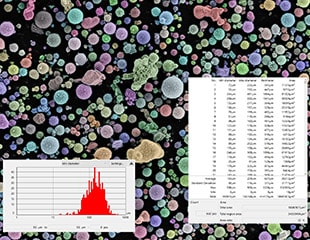
- What Are Particle Size Distribution and Particle Size Analysis Using Image Processing?
- Examples of Particle Size Distribution and Particle Size Analysis Using KEYENCE’s Latest 4K Digital Microscope
- View, Capture, and Measure with Just One Device
What Are Particle Size Distribution and Particle Size Analysis Using Image Processing?
Image binary processing refers to converting an image having gradations to black and white. The value of each pixel is compared against a set arbitrary threshold. Values larger than the threshold are converted to black. Values smaller than the threshold are converted to white. The range over which to perform binary processing can also be specified.
Performing binary processing on an image makes it possible to perform the processing of extracting just the information of whether a pixel is black or white from the required part, thereby making particle size analysis easier and faster.
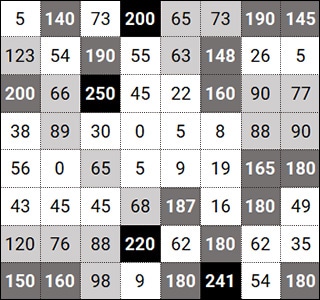
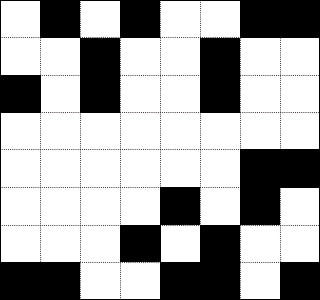
Examples of Particle Size Distribution and Particle Size Analysis Using KEYENCE’s Latest 4K Digital Microscope
Conventional laser diffraction and laser dispersion methods cannot be used to observe actual particles.* What’s more, observation with microscopes requires a high degree of proficiency, and the obtained data must be analysed with different software.
In particle size distribution and particle size analysis using the VHX Series 4K Digital Microscope, various measurements can be performed while observing the actual particles. Lastly, automatic area measurement using image binary processing as well as imaging setting reproduction and calibration can be performed with easy operations, enabling even inexperienced inspectors to carry out these tasks.
Laser diffraction and laser dispersion methods
Methods in which laser emission is used for particle size distribution and particle size analysis. These measurement/analysis methods use the regularity of how the strength of the dispersed light is proportionate to the number of particles and the relationship between the size of the particles and the dispersion/diffraction pattern.
Automatic area measurement
Area measurements and counts can easily be carried out within the specified range on the target. After the image is binary processed according to brightness or colour, parameters such as the area, maximum diameter, and minimum diameter can be calculated; targets that are not required can be excluded; and overlapping targets can be separated. It is also possible to perform analyses with the same conditions by using image data that was measured in the past.
Furthermore, measured values can be output to tables and histograms, which makes it possible to quantitatively determine the particle size distribution characteristics.
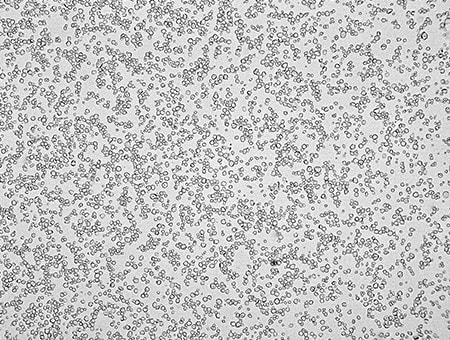
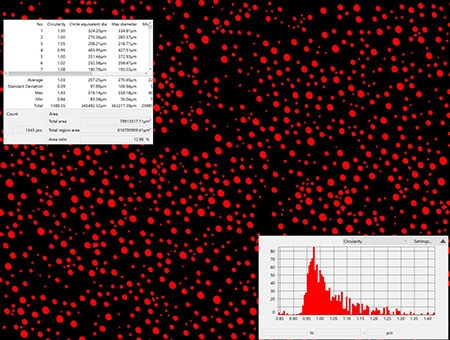
Imaging setting reproduction and calibration
With the VHX Series 4K Digital Microscope, past imaging settings can be reproduced just by selecting saved images from the album. The same imaging conditions as the previous observation can be used regardless of which inspector performs the observation or when the observation is performed.
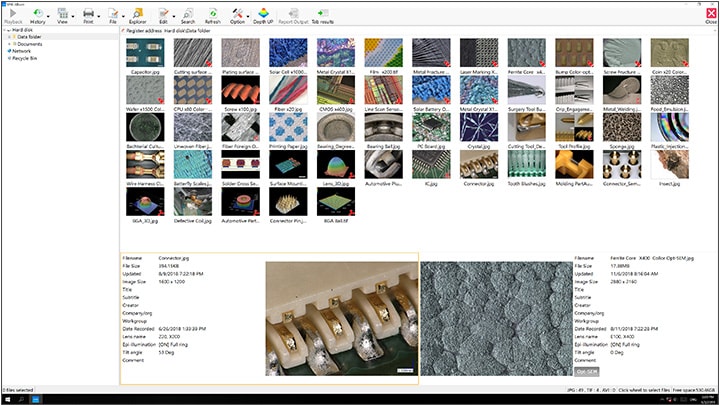
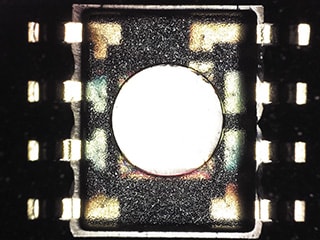
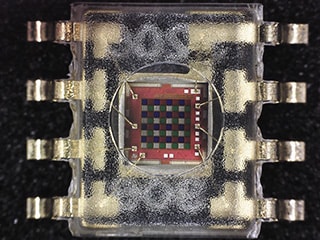
Conventionally, calibration required the placing of a focus scale in an accurate position. However, the VHX Series enables one-push calibration; simply install a dedicated scale and perform a one-click operation. The lighting conditions, shutter speed, white balance, and other such correction values required by the lens are loaded, and motorised control of the X, Y, and Z axes is performed to automatically align the positions and the focus.
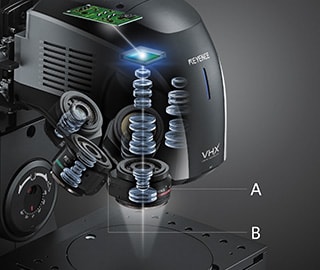
- A. High-resolution lens
- B. Motorised revolver
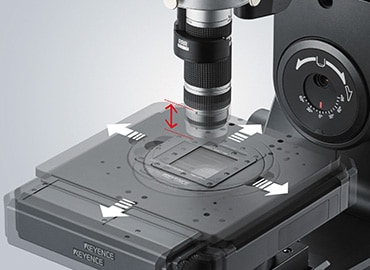
Furthermore, the VHX Series is fully loaded with functions that reduce the load of particle size analysis such as high-resolution lenses and a motorised revolver that enable seamless zoom that can change the magnification between 20x and 6000x without lens replacement. All operations are easy to perform, so even people who have difficulty handling machines can quickly and accurately perform observation and analysis.
View, Capture, and Measure with Just One Device
The VHX Series high-definition 4K Digital Microscope offers excellent efficiency and makes it possible to eliminate human errors and ensure accurate particle size distribution and particle size analysis.
The high-definition 4K images generated by the cutting-edge optical image processing and automation techniques allow for particle size distribution and particle size analysis with simple operation, contributing to producing quick, sophisticated analysis results.
The captured or measured data can be easily output as a report with a fixed format using the report function. Sharing this data via an intranet server can be useful for not only quality assurance and ensuring conformity with industrial standards but also for identifying the causes of problems when they occur and for process improvement.
Equipped with many other advanced functions, the VHX Series can be a powerful partner for particle size distribution and particle size analysis. For details, click the button shown below to download the catalogue. For inquiries, click the other button shown below to contact KEYENCE.


